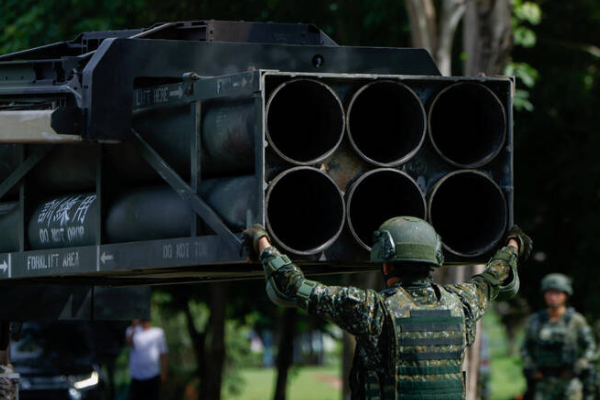Taiwan’s military has began deploying one of its most powerful precision-strike weapons, the HIMARS (High Mobility Artillery Rocket System), as part of the country’s largest-ever Han Kuang military exercises, signaling a greater readiness to defend against a possible Chinese invasion.
Armoured trucks transporting HIMARS units were spotted driving around Taichung’s center city on the fourth day of the 10-day training.
The deployment is part of a series of rigorous exercises to simulate a full-scale Chinese attack and showcase Taiwan’s defense capabilities.
“These drills are meant to test real combat readiness,” said Colonel Chen Lian-jia, a military spokesperson.
“In a real conflict, HIMARS units must remain concealed from enemy surveillance—whether satellites, drones, or operatives—until the moment they are ordered to strike.”
Fire simulations and live-fire exercises involving Taiwan’s air and naval forces are expected next week.
The HIMARS units, manufactured by U.S. defence giant Lockheed Martin, have been used effectively by Ukraine in its war against Russia.
Taiwan received the first 11 of 29 systems in 2024 and conducted initial testing in May.
Read Also
With a strike range of approximately 300 kilometres (190 miles), the systems are capable of hitting key coastal targets in China’s Fujian province across the Taiwan Strait.
The Han Kuang exercises are intended to simulate real-world wartime scenarios—from cyberattacks on command networks to full-scale invasions.
Military officials stress the unscripted nature of the drills, which aim to send a clear message to both Beijing and the international community: Taiwan is prepared and determined to defend its sovereignty.
China, which claims Taiwan as its territory, dismissed the drills as “a bluff” and reiterated its opposition to U.S.-Taiwan military cooperation.
Over the last five years, Beijing has increased its pressure on the island, conducting near-daily military patrols and large-scale war games.
President Lai Ching-te has categorically rejected China’s claims, declaring that only Taiwanese citizens can decide their own future.
According to regional defense observers, the deployment of HIMARS during battle drills will be closely monitored by both friends and foes. Australia has also acquired the systems, highlighting their strategic importance.
As tensions in the Taiwan Strait remain high, these drills are viewed as both a deterrent to invasion and a reminder of Taiwan’s willingness to defend its democracy.






